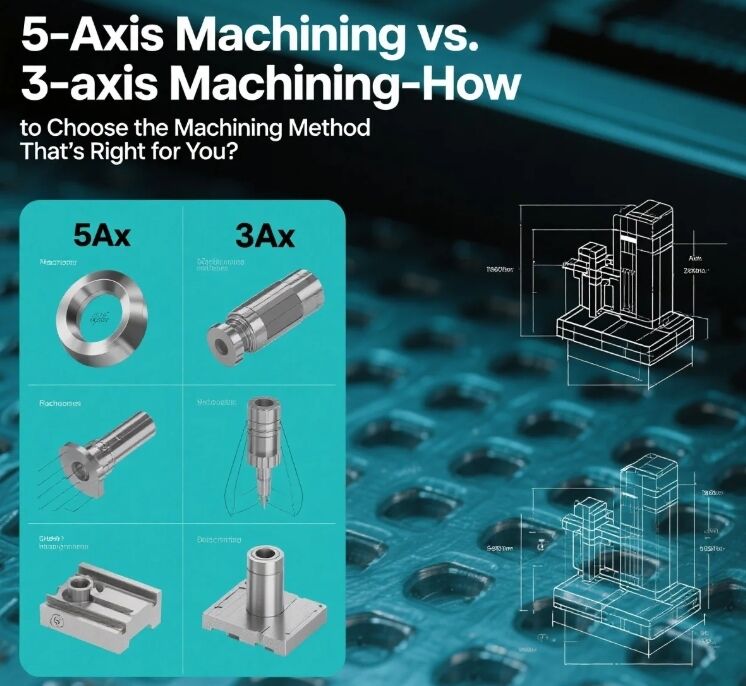Чи знаходилися коли-небудь у ситуації, коли постачальник запитує: «Чи потрібна вам обробка на 3-осевому чи 5-осевому станку?» Розрив у ціні великий, але різниця здається неочевидною. Давайте розберемо це простими словами, щоб ви більше ніколи не переплатили.
1. Головна різниця: Все справа про рух
3-вісні машини працюють як розрізання тофу кухонним ножем — інструмент рухається тільки в трьох лінійних напрямках (X, Y, Z). Ідеально підходить для простих блоків або пластин, але обертати деталь вручну для багатосторонніх завдань? Скажіть привіт додатковому часу та помилкам у вирівнюванні.
5-вісні машини є схожими на роботизовані руки — вони додають два обертових віси (A/B/C) до інструмента або заготовки. Уявіть собі, як наклоняєте тофу під будь-яким кутом і розрізаєте криві без зусиль. Одна установка обробляє складні форми, косокутні отвори, лопатки турбін або вітрилки.
2. 5-вісний vs. 3-вісний: П'ятиперкова перевірна список
A . Складність деталі
1.Оберіть 3-вісний, якщо:
- Проста геометрія (кути, плоскі пластини)
- ≤3 обробних поверхні (не потрібен нахил)
- Обмежений бюджет (3-вісний вартує на 30-50% дешевше за годину)
2.Переходьте до 5-осевого режиму, коли:
- Складні криві, вироби з підкресленнями або органічними формами (наприклад, медичні імплантати)
- Багатогранна обробка у одній установці (немає помилок при перепозиції)
- Дорогі матеріали (5-осова система зменшує витрати титану/Інкоцеля)
2. Час vs. Бюджет
3-вісний вимагає перевороту деталей та зміни інструментів для складних завдань — додає 30%+ часу. Але для простих деталей? 3-вісний перемогає (дешевше запускати кілька машин).
3. Перевірка вартості
- Ціна апарату : 5-вісний = 2-3х вартість 3-вісного + дорожчий сервіс.
- Годинна ставка : 5-вісний заряджатиме більше, але загальна вартість може зменшитися для складних деталей (економить працю/час).
- Порада експерта : Виділяйте 5-вісній обробці для малих партій; купуйте 3-вісний, якщо масово виробляєте прості деталі.
4. Потреби точності
тolerances 3-вісної спадають при багатьох налаштуваннях (±0.1мм). 5-вісна підтримує ±0.02мм за один раз. Аерокосмічна галузь чи мікромолди? 5-вісна незамінна.
5. Вміння має значення
3-вісний: Легко програмувати (можна навчити новачка за кілька днів).
5-вісний: Потрібне сучасне програмне забезпечення CAM та інженери — малі майстерні часто не мають необхідної експертизи.
3. Уникайте цих витратних помилок
- Не перестараннюйте : Прості деталі на 5-вісній = спалювання грошей.
- Пропустіть покупку 5-осевої, якщо : Низький обсяг замовлень — орендуйте час роботи верстату.
- Перевірте обидва : Проектуйте з 3-осовими та 5-осовими магазинами. Порівняйте якість/вартість перш ніж переходи до повного виробництва.
Таблиця швидких рішень
|
Сценарій |
Рішення |
|
Прості деталі + обмежений бюджет |
машинообробка з 3 осями |
|
Складні криві + висока точність |
обробка на 5-осевих станках |
|
Складність малих партій |
Виконати 5-осеву операцію за межами |
|
Масове виробництво простих деталей |
Власні 3-вісні машини |
Останній порада : Завжди уточнюйте малюнки з вашим постачальником та перевіряйте їх обладнання. Ржава 5-вісна машина або недосвідчений оператор можуть зруйнувати навіть найкращий дизайн!
(Усе ще замішаний? Надішліть нам малюнок вашої деталі — ми проаналізуємо його безкоштовно!)


